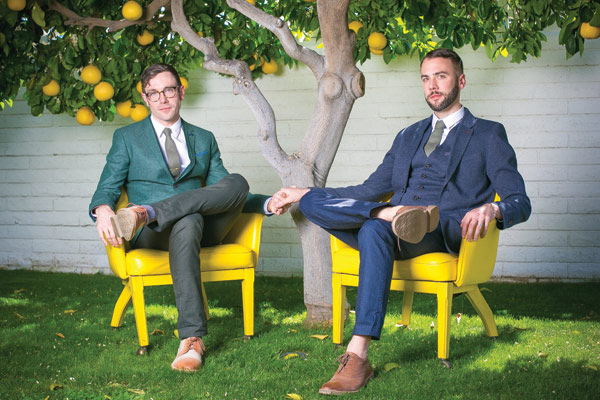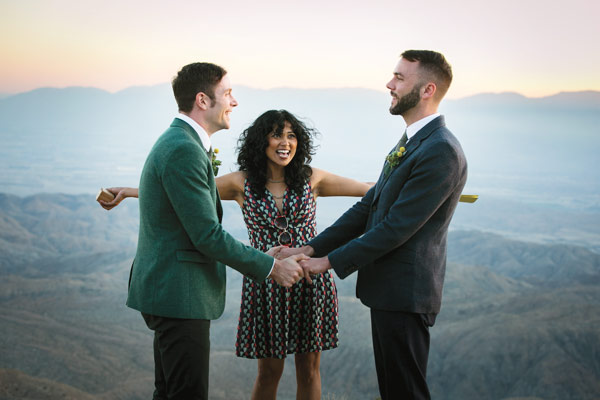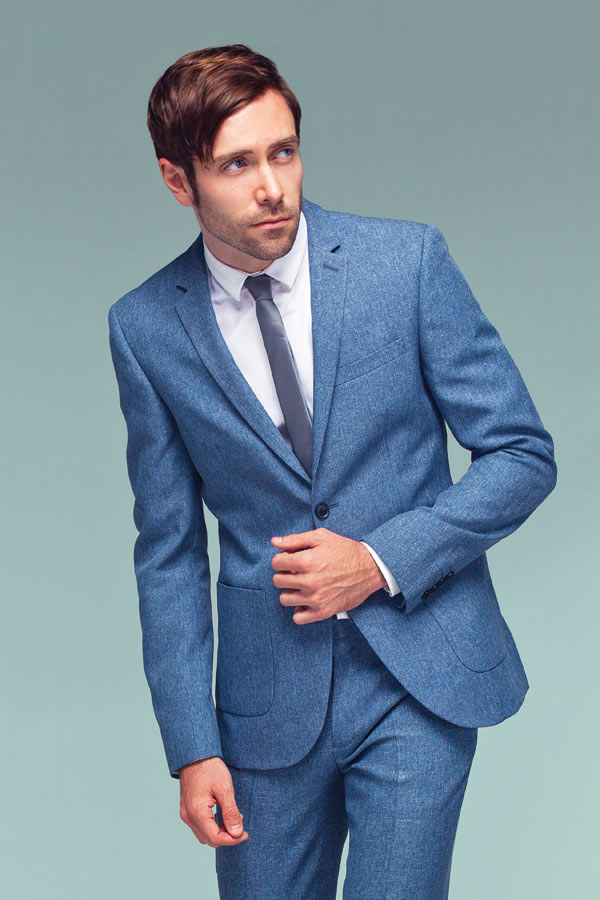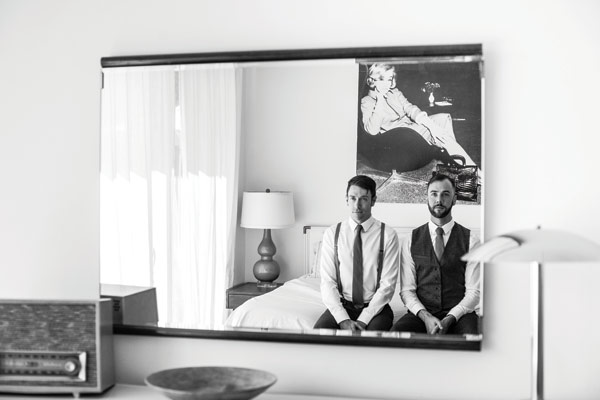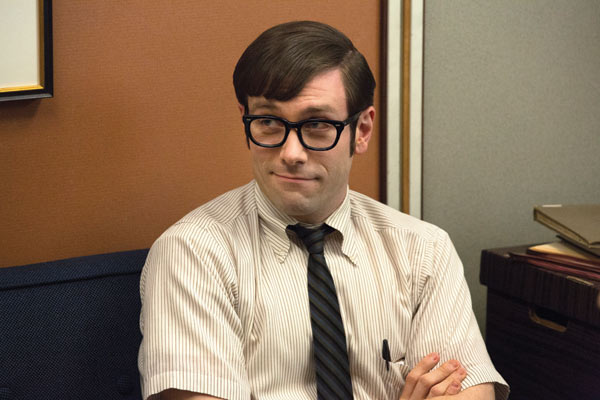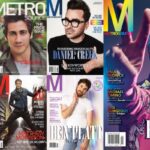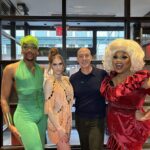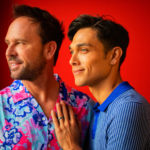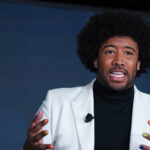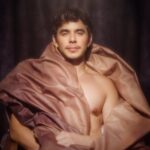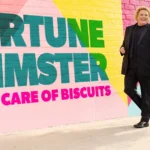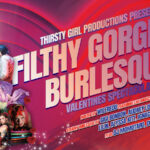Recently-married television and film star Kit Williamson offers a glimpse behind the scenes of his wedding day and his critically acclaimed series.
It’s been a busy few years for Kit Williamson, who played a role in the final seasons of AMC’s Mad Men while also creating and starring in the Emmy-nominated series Eastsiders and marrying his series co-star John Halbach.
Tell me about getting engaged! Was it a surprise?
It was a surprise when John actually proposed. It was about a year ago, on the day that I was officially moving to New York to join him. … When I got there, he had covered the entire apartment in candles and had bought a lit-up sign that said “Will you marry me?”
I’d love to hear about the wedding day.
We chartered a bus in Palm Springs and put 50 of our closest friends and familiy members on it to go to the middle of the desert in Joshua Tree. … We thought it would be fun to take everybody and bring them someplace completely unexpected.
Tell me about the genesis of your show, Eastsiders.
I was in graduate school. … I had never directed anything before, and I certainly had never directed anything that I acted in at the same time. But I decided that it would be a good experience for me to wear all of the hats that I possibly could. So I wrote, directed, acted in and executive produced the show.
For those who haven’t seen it, describe Eastsiders.
Eastsiders is a dark comedy about a gay couple living in Silver Lake, California — trying to stay together through drunken outbursts, double standards and dirty deeds.
What does it feel like to be nominated for an Emmy?
It’s really amazing to have the show recognized by such an established curating body because it shows not just that our show is ready to be taken seriously, but that [web series] in general deserve more respect. Increasingly, some of the most exciting storytelling that’s happening out there is micro-budget, independent filmmaking online.
What’s important about writing gay characters now?
We need to take some of the pressure off them to model ideal behavior as citizens. They’re not representatives of the gay community: they’re just characters. They’re people with flaws and complexities. I want to afford gay characters the same [opportunities] to mess up their lives as straight characters are afforded. Not everything is a morality tale. And I think that a lot of people in the gay community want to police the actions of gay characters … but I think that’s short-sighted. I think ultimately we’re all human, and we all deserve to have complexities.
Who inspires you?
I’m incredibly inspired by John Cameron Mitchell. I think he has forged his own unique path and created such incredible art along the way. Similarly, I think that the Scissor Sisters are brilliant. I think that they are another example of a group of artists who are allowing their creativity to be their driving force, and trusting that people will respond to it and go on the journey. I recently read an interview with RuPaul, where he talked about fame and success and culture. I thought it was incredibly profound what he said about accepting that if you steer your own path, you might not be the most popular. He asks the question: Do I want to be someone who Betty and Joe Beer Can are not threatened by? Because they’re threatened by everything! I’d really like to adopt that ethos, follow that set of guidelines, and keep making art that is unique and important to me — and hopefully it will be important to others.
How do you celebrate Pride?
I think that Pride is something that should be celebrated every day — not just during the parade — because as a community we have overcome so much to get to where we are; to see the advances that we have made towards equality in recent years and the hearts that we have changed along the way. I would say that I am incredibly proud to be a part of such a vibrant, artistic, intellectual community.
As Our interview with Kit Williamson continues, he’s got more to share about his wedding, his acting and his activism.
METROSOURCE: With so much going on in your career, how was wedding planning for you?
KIT WILLIAMSON: Surprisingly painless, considering how much goes into it. We knew we wanted things to be low-key; so we just rented a house for us and our siblings to stay at and decided to have our reception there. The hardest part was planning everything remotely, and not getting to meet vendors face-to-face. But we kind of had to adopt an attitude that we were just going to go with the flow and let whatever happens happen, and that led to us really just being able to let go and have a fun time.
Why choose Joshua Tree as your wedding destination?
We spent a lot of anniversaries and vacations there when we lived in Los Angeles, exploring the desert and the areas around Palm Springs. We wanted to share that with our families.
What’s it been like working creatively with your significant other?
It’s really incredible. It’s like having two brains at once. We approach things very differently, so it’s very complementary and allows me to keep an even head. He’s more even keeled, and I’m a little bit more manic, so it’s really good. We bring out the best in each other.
How was working on the last few seasons of Mad Men?
It was such an incredible experience that I will carry with me for the rest of my life. I am so grateful to have been a part of such an important show. And I was a huge fan of the series before I got to even audition for it. So to have been able to be on it for two seasons has been mind blowing. I feel like I got to step inside of the TV.
What are you particularly excited about right now?
I’m working on my feature film directing debut, which is a indie-drama about the consequences of the high price of medications that speaks to some of the same issues as the Martin Shkreli’s Daraprim scandal. … I’ve been developing a script for the last year with a doctor who for years worked in the free clinic systems treating patients with HIV and AIDS. And we’re trying to tell a story about … the ways in which our health care systems are failing some of society’s most vulnerable.
When do you think it’s going to come out?
We go into production in the end of the summer. As far as the stuff that’s already in the can, I just wrapped on two independent feature films that are both LBGT, that are doing a festival tour. This first is Kiss Me, Kill Me which is a gay noir movie set in West Hollywood. I play a drug dealer named Travis. That’s got some great people in it like Shangela, Brianna Brown, and Gale Harold from Queer as Folk. And then I’m in Retake, which stars Tuc Watkins, and I play a prostitute — like a hustler — in downtown Los Angeles.
Speaking of “coming out” — what was it like growing up and coming out in Mississippi?
Coming out in Mississippi was really hard, and I felt like I didn’t have any choice but to leave. But I know that a lot of people do stick it out, and make it work in tougher parts of the country like that, and they have my admiration. Because it was overwhelming for me — the idea of being other, the idea of not belonging in my community. So I went to boarding school when I was 16 [years old] in Michigan to try to hit the reset button on my life and start a new life, where I could be myself and live openly. I think that there have been a lot of good advances, and a lot of progress in states like Mississippi in recent years. To see that the conservative reaction to that progress is to try to double down on hate, and to make sure that people know that they aren’t welcome to be themselves in Mississippi: it makes me incredibly sad.
Do you have hope for future progress anyway?
What gives me hope is seeing the progress that people in my life have made over the years: people in my extended family getting to know my partner and celebrating our marriage in a way that I never expected — to see them not only accept but celebrate us. That has been extraordinary. We had an engagement party in Mississippi, and so many people from my childhood and my family showed up that I truly didn’t think would support the idea of two men being married. But at the end of the day, they wanted to support us more than they wanted to hold on to the negative things that they had felt about gay marriage in the past. And we were able to show them that we were as deserving of happiness together — as they are, as anyone is. So that’s what gives me hope: that by being a part of these communities, by staying in contact with people who maybe are not treating you fairly, we can (as the saying goes) change hearts and minds.
Why is it important to be a gay activist in 2016?
We’re at a really pivotal time, where we will either continue to make advances towards a more equal society, or we will see some of our rights rolled back under the auspices of religious freedom, and we cannot allow that to happen.
Tell me about your involvement with “The New Hollywood.”
This year I founded the LGBT branch of my friend Brianna Brown’s nonprofit The New Hollywood [TheNewHollywoodLGBT.org]. It’s a group of out entertainment industry professionals who support one another to set goals and support LGBT artists in entertainment: socially conscious filmmakers. … Our first initiative is the “Emerging Voices of Student Filmmaker” program. It’s a mentorship program where we award small grants to LGBT high school and college filmmakers who are working on short film projects with social justice themes. Then we pair them with a member of our group to guide them through the process of completing a short film project. Our hope is that we can encourage the younger generation to tell socially conscious stories to our community.
Last modified: January 17, 2018

